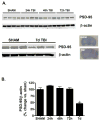Delayed reduction in hippocampal postsynaptic density protein-95 expression temporally correlates with cognitive dysfunction following controlled cortical impact in mice
- PMID: 20397893
- PMCID: PMC3155981
- DOI: 10.3171/2010.3.JNS091212
Delayed reduction in hippocampal postsynaptic density protein-95 expression temporally correlates with cognitive dysfunction following controlled cortical impact in mice
Abstract
Object: Traumatic brain injury (TBI) induces significant neurological damage, including deficits in learning and memory, which contribute to a poor clinical prognosis. Treatment options to limit cognitive decline and promote neurological recovery are lacking, in part due to a poor understanding of the secondary or delayed processes that contribute to brain injury. In the present study, the authors characterized the temporal and spatial changes in the expression of postsynaptic density protein-95 (PSD-95), a key scaffolding protein implicated in excitatory synaptic signaling, after controlled cortical impacts in mice. Neurological injury, as assessed by the open-field activity test and the novel object recognition test, was compared with changes in PSD-95 expression.
Methods: Adult male CD-1 mice were subjected to controlled cortical impacts to simulate moderate TBI in humans. The spatial and temporal expression of PSD-95 was analyzed in the cerebral cortex and hippocampus at various time points following injury and sham operations. Neurological assessments were performed to compare changes in PSD-95 with cognitive deficits.
Results: A significant decrease in PSD-95 expression was observed in the ipsilateral hippocampus beginning on Day 7 postinjury. The loss of PSD-95 corresponded with a concomitant reduction in immunoreactivity for NeuN (neuronal nuclei), a neuron-specific marker. Aside from the contused cortex, a significant loss of PSD-95 immunoreactivity was not observed in the cerebral cortex. The delayed loss of hippocampal PSD-95 directly correlated with the onset of behavioral deficits, suggesting a possible causative role for PSD-95 in behavioral abnormalities following head trauma.
Conclusions: A delayed loss of hippocampal synapses was observed following head trauma in mice. These data may suggest a cellular mechanism to explain the delayed learning and memory deficits in humans after TBI and provide a potential framework for further testing to implicate PSD-95 as a clinically relevant therapeutic target.
Figures




References
-
- Ansari MA, Roberts KN, Scheff SW. A time course of contusion-induced oxidative stress and synaptic proteins in cortex in a rat model of TBI. J Neurotrauma. 2008;25:513–526. - PubMed
-
- Ashman TA, Cantor JB, Gordon WA, Sacks A, Spielman L, Egan M, et al. A comparison of cognitive functioning in older adults with and without traumatic brain injury. J Head Trauma Rehabil. 2008;23:139–148. - PubMed
-
- Bramlett HM, Green EJ, Dietrich WD. Hippocampally dependent and independent chronic spatial navigational deficits following parasagittal fluid percussion brain injury in the rat. Brain Res. 1997;762:195–202. - PubMed
-
- Cheng D, Hoogenraad CC, Rush J, Ramm E, Schlager MA, Duong DM, et al. Relative and absolute quantification of postsynaptic density proteome isolated from rat forebrain and cerebellum. Mol Cell Proteomics. 2006;5:1158–1170. - PubMed
Publication types
MeSH terms
Substances
Grants and funding
LinkOut - more resources
Full Text Sources

